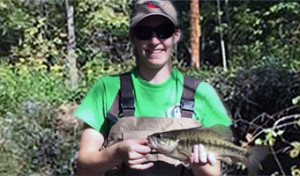
Jackie (Smith) Kloepfer holding a small mouth bass in Sharps Fork, a tributary of Federal Creek, in Athens County. “I was helping with a water quality monitoring project, one of many that ODNR-DMRM performs every year in various watersheds across southeast Ohio.
“I am currently splitting my time between two professions: Research Associate at the Voinovich School and Environmental Specialist for Ohio Department of Natural Resources, Division of Mineral Resources Management.”
Jackie (Smith) Kloepfer graduated with her B.A. in Anthropology and minor in Geography in 2008 from the College of Arts & Sciences at Ohio University.
She and Dan Kloepfer ’08 (B.A. in Political Science and Spanish), headed to Nevada with Americorps to build trails and restore desert habitat. A year later they were back in Ohio and Jackie worked as an archaeologist in Indiana and West Virginia with a Culture Resource Management firm.
When Dan graduated from Oregon State University in 2013 with a Master’s in Public Policy, they came back to Ohio.
“My work with AmeriCorps and Cultural Resource Management (CRM) helped prepare me for my particular career path. While volunteering with AmeriCorps in Nevada, I performed trail construction and maintenance, invasive plant removal, and data collection, all in direct service to the natural environment and alongside state and federal resource management agencies.”
Back to school
“The experience definitely encouraged me to go back to school for a Master’s degree.
“Working in CRM, as well as studying Archaeology during college, helped me understand the importance of documenting and protecting cultural resources and most importantly understanding the relationship between humans and the environment.
“I graduated from Ohio University (again!) last May with a Masters degree in Environmental Studies.
“I have been able to incorporate my experiences and education into a career path that is both dynamic and rewarding.”
Environmental Specialist
“One of the advantages of working in academia and state government is that I have the opportunity to work alongside a variety of stakeholders, from state officials, academics, and scientists, to students and the public.
“I love that I can use GIS to help advance climate change knowledge and also bring awareness to the 200-year mining legacy of southeast Ohio.
“Natural resource extraction in this region helped fuel our nation’s industrial advancements but has left behind many environmental and social problems. Every day offers me an opportunity to learn or do something new and I really enjoy that!
“As an Environmental Specialist for the Abandoned Mine Land (AML) Program, a program within Ohio Department of Natural Resources Division of Mineral Resources Management, a majority of my responsibilities revolve around geographic information systems (GIS), in which I conduct complex analysis of geospatial data and related database resources associated with above and below-ground coal and industrial mineral mines.
“In addition, I assist field staff with environmental monitoring of acid mine drainage (AMD) impacted watersheds using MAIS (macroinvertebrate index for streams) and electrofishing techniques. Many people probably don’t know what the AML program is/does.
“It uses state and federal funds (and a severance tax from every ton of coal extracted from Ohio) to design and construct projects to address the environmental, public health, and safety problems related to abandoned mines in Ohio (sink holes, poor water quality, dangerous mine shafts, etc.). Our field office is based out of Zaleski, Ohio (near Lake Hope State Park).
Research Associate
“As a Research Associate at the Voinovich School of Leadership and Public Affairs, I am working on a Local Governments and Public Agencies Survey with Environmental Studies Associate Professor Dr. Derek Kauneckis.
“My responsibilities for the GIS portion of the project include geocoding addresses of local, state, and federal agencies, collecting, managing, and editing large spatial and nonspatial datasets on climate impacts, FEMA disaster funds, and climate change, and producing visualizations from these data for publication. I also work a lot with current students as a leader on projects and as a mentor.”



















Comments